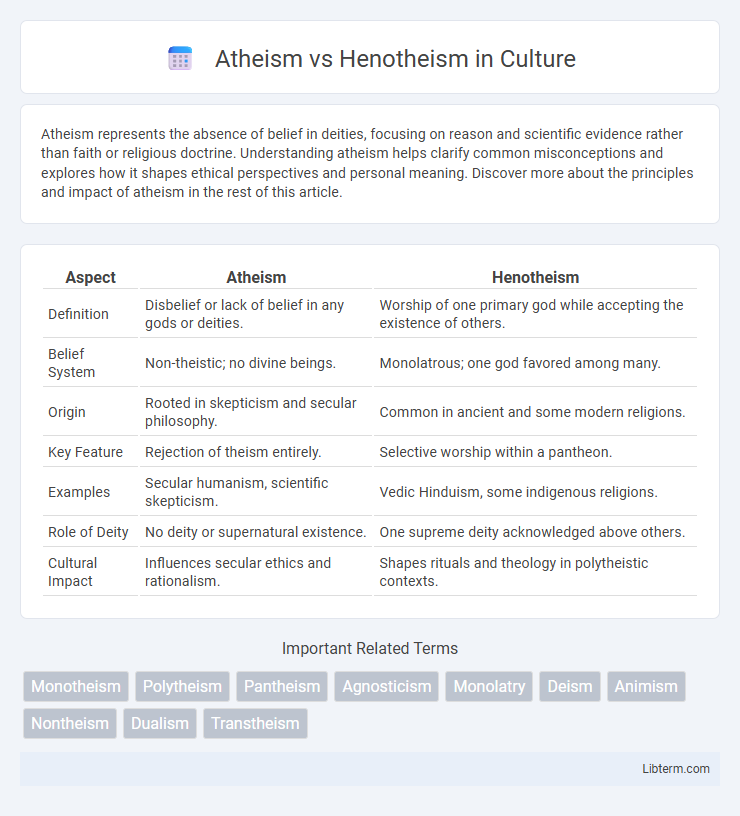Atheism represents the absence of belief in deities, focusing on reason and scientific evidence rather than faith or religious doctrine. Understanding atheism helps clarify common misconceptions and explores how it shapes ethical perspectives and personal meaning. Discover more about the principles and impact of atheism in the rest of this article.
Table of Comparison
| Aspect | Atheism | Henotheism |
|---|---|---|
| Definition | Disbelief or lack of belief in any gods or deities. | Worship of one primary god while accepting the existence of others. |
| Belief System | Non-theistic; no divine beings. | Monolatrous; one god favored among many. |
| Origin | Rooted in skepticism and secular philosophy. | Common in ancient and some modern religions. |
| Key Feature | Rejection of theism entirely. | Selective worship within a pantheon. |
| Examples | Secular humanism, scientific skepticism. | Vedic Hinduism, some indigenous religions. |
| Role of Deity | No deity or supernatural existence. | One supreme deity acknowledged above others. |
| Cultural Impact | Influences secular ethics and rationalism. | Shapes rituals and theology in polytheistic contexts. |
Introduction to Atheism and Henotheism
Atheism is the absence of belief in any deities, emphasizing skepticism and reliance on empirical evidence. Henotheism involves devotion to one primary god while acknowledging the existence of other deities within a polytheistic framework. These distinct perspectives shape diverse religious and philosophical approaches to the concept of divinity and spiritual practice.
Defining Atheism: Core Principles
Atheism is defined by the absence of belief in any deities, emphasizing a reliance on empirical evidence and rational inquiry over faith or religious doctrine. Core principles of atheism include skepticism towards supernatural claims and a commitment to secular ethics based on human reason and scientific understanding. Unlike henotheism, which acknowledges a primary god while accepting others, atheism rejects theistic beliefs entirely.
Understanding Henotheism: Key Concepts
Henotheism centers on the worship of one primary deity without denying the existence of other gods, distinguishing it from monotheism and polytheism by its singular devotional focus. This belief system acknowledges multiple deities but elevates one as supreme in practice or belief, reflecting cultural and religious flexibility. Understanding henotheism involves recognizing its role in ancient religions where a dominant god was worshiped alongside a pantheon, emphasizing loyalty to one deity while accepting others' divinity.
Historical Perspectives on Belief Systems
Atheism, characterized by the absence of belief in deities, emerged prominently in ancient Greek philosophy with figures like Democritus and Epicurus questioning divine existence, while Henotheism, the worship of one god without denying others, was prevalent in early Vedic religion and ancient Egyptian belief systems. Historical perspectives reveal that henotheistic practices often served as transitional phases between polytheism and monotheism, whereas atheism challenged foundational religious doctrines and promoted secular rationalism. The evolution of these belief systems reflects shifting cultural, philosophical, and theological dynamics throughout human history.
Major Differences Between Atheism and Henotheism
Atheism is characterized by the absence of belief in any deity or divine beings, whereas henotheism involves the worship of one primary god without denying the existence of others. Atheism relies on a secular, non-theistic worldview, while henotheism is rooted in religious frameworks that acknowledge multiple gods but prioritize devotion to a single deity. The major difference lies in atheism's foundational rejection of all gods, contrasted with henotheism's selective worship within a polytheistic context.
Philosophical Foundations of Both Worldviews
Atheism, grounded in empirical skepticism, denies the existence of deities and bases knowledge on scientific inquiry and rationalism. Henotheism acknowledges the existence of multiple gods but worships one supreme deity, reflecting a blend of monotheistic devotion and polytheistic belief systems. Both worldviews address the nature of divinity and existence through distinct metaphysical and epistemological frameworks, influencing ethical and existential philosophies.
Approaches to Morality: Atheism vs Henotheism
Atheism approaches morality primarily through secular ethics, emphasizing reason, empathy, and societal well-being without reliance on divine authority. Henotheism grounds moral principles in devotion to one primary deity among many, often linking ethical behavior to religious texts and rituals associated with that specific god. The distinction lies in atheism's foundation on human-centered values versus henotheism's integration of divine allegiance in moral frameworks.
Cultural Influence and Societal Impact
Atheism, characterized by the absence of belief in deities, often fosters secular societies emphasizing scientific inquiry and individual freedom, which can lead to progressive social policies and increased separation of religion and state. Henotheism, the belief in one primary deity without denying others, shapes cultures by promoting religious pluralism and ritualistic traditions that maintain social cohesion and moral frameworks within diverse communities. Both belief systems significantly influence cultural narratives, legal structures, and community identities, reflecting varying approaches to spirituality and governance.
Modern Discussions and Trends
Modern discussions on atheism versus henotheism revolve around individual belief systems and cultural integration, with atheism emphasizing the absence of belief in deities and henotheism recognizing one primary god while accepting others' existence. Recent trends highlight the rise of secularism and scientific rationalism influencing atheism, contrasting with the resurgence of henotheistic practices in interfaith dialogues and neo-pagan movements. Digital platforms and social media have amplified debates, providing spaces for nuanced exploration of both worldviews and their implications on identity and spirituality.
Conclusion: Comparing Atheism and Henotheism
Atheism rejects the existence of any deity, emphasizing a secular worldview grounded in empirical evidence and skepticism. Henotheism acknowledges the existence of multiple gods but elevates one god as supreme, blending monotheistic reverence with polytheistic belief. This fundamental difference shapes distinct approaches to spirituality, morality, and the interpretation of divine authority in human life.
Atheism Infographic

 libterm.com
libterm.com